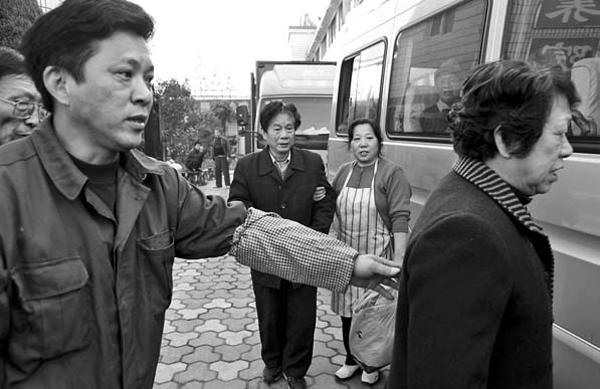Government and Policy
Relocation trauma could be reduced
By Cao Li (China Daily)
Updated: 2010-03-09 06:53
 |
Large Medium Small |
|
 |
|
Staff at the care home in Shanghai help elderly residents onto a minibus to transfer them and their belongings to new homes last November. About 100 now live in the city’s Jiading district. |
"My driver was arrested so I had to drive the van to move the elderly people and their belongings myself, twice a day," said Zhang. He moved more than 100 retirees to a place in the city's Jiading district.
Within weeks, his old care home - comprising two four-story buildings - was demolished. He received 10 million yuan in compensation last month.
Zhang's story attracted little media attention. Just days after his fight ended, though, forced relocation was thrust to the top of the nation's agenda when 47-year-old Tang Fuzhen set herself ablaze in Chengdu, capital of Sichuan province, to protest the demolition of her ex-husband's property.
The incident prompted a joint appeal by five law professors from Peking University for the standing committee of the NPC to focus on preventing similar tragedies. They warned that forced relocation was a major risk to social stability. In an open letter to the NPC, they laid the blame squarely on rules introduced in 2001 that allow developers to demolish homes even if residents still hold certificates of ownership.
Under the existing law, companies only need a relocation permit from a city, county or district housing department to demolish properties after obtaining the land. The regulations conflict with the principles of the Constitution that protect individual rights, the professors said.
It took the NPC and State Council just nine days to call a meeting to discuss the draft of the Regulation on Property Requisition.
The State Council has been working on the draft since 2007, when the Property Law came into force, said Jiang Ming'an, a Peking University law professor who attended the meeting. "The State Council has encountered lots of opposition from local governments and property developers as their interests will be inevitably harmed. The fatal incident involving Tang Fuzhen has sped up the process, though," he said.
The legislative office of the State Council published a draft of the Regulation on Property Requisition to solicit public opinion on Jan 29. In 14 days, more than 13,000 people lodged suggestions on the office's website - the largest response it has ever had to a public consultation. Officials decline to reveal how many letters and emails it had received.
Revisions to the law will be based on the suggestions, an official from the State Council surnamed Peng said. He did not specify when the law will be implemented.
Although legal experts say the regulation needs further revision, Jiang said it could be approved as early as May.
Analysts have consistently called for a clear line to be drawn between public and commercial interests. In the new regulation, their calls have been answered.
The revised rules state local authorities will only be able to requisition property as part of projects that involve national defense, government buildings, energy, transportation, technology, education and culture, or housing developments that improve living standards.
However, as about 80 percent of all forced relocations are due to commercial reasons, homeowners will also be given more protection to prevent "ruthless practices", said Jiang.
Once the regulation is approved, companies will need all homeowners on land earmarked for development to agree to move.
Public hearings will also evaluate plans and decide on compensation to meet market prices. Projects to reconstruct a city's old town will need more than 90 percent of its residents to agree on the decision and two thirds to agree on the compensation, the draft states.







